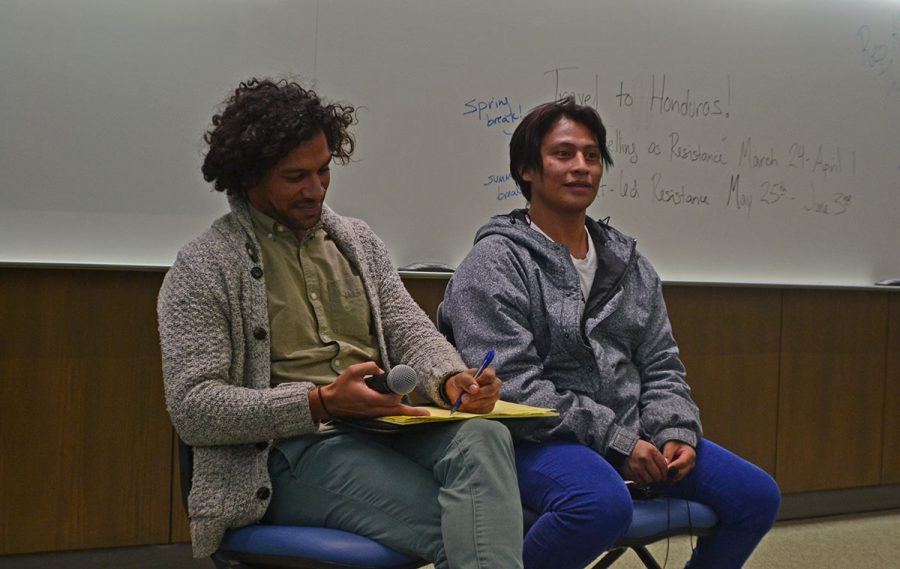Fighting for human rights in Honduras
A spokesman for sexual diversity rights, Gaspar Sánchez, came to UW-Eau Claire to discuss the struggle for awareness in Honduras
More stories from Casey Ryan
Photo by Kar Wei Cheng
Latin American Studies week came to a close Tuesday night with Gaspar Sánchez speaking about sexual diversity and indigenous peoples rights in Honduras.
Gaspar Sánchez spoke about the struggle for LGBTQ awareness and rights among indigenous communities in Honduras.
Sánchez is the sexual diversity coordinator for Civic Council of Popular and Indigenous Organizations of Honduras (COPINH), an organization founded by indigenous leader Berta Cáceres, who was assassinated in March 2016.
Students, professors and Eau Claire community members gathered to hear Sánchez’s presentation at 4 p.m. on Tuesday in Centennial Hall.
Working to address the issue of human rights in communities, COPINH specifically focuses on the LGBTQ community and women.
“… Also (COPINH is) promoting the involvement of women so they can be leaders in their communities, that they can be part of decision-making processes and also so that they can become property owners — land-title holders — of the land that they work because historically it’s been only men who can own land,” Sanchez said.
The main threat facing indigenous peoples, Sánchez said, is the privitazation of companies and the project concessions. There are currently 950 mine projects slated and 111 hydroelectric dam concessions without the consultation of the affected communities.
“The struggles of the current indigenous populations that are having to confront have to do with the privatization with the healthcare system, the education and also our territories since the coup in 2009,” Sánchez said.
This has to do with an economic development model, Sánchez said. He said it doesn’t benefit the communities, but it benefits the private companies at the expense of the communities; he also said the direct threat the communities face from this model is the militirization from their territories.
“Both the military and the police are here to protect the private companies, and so when the communities rise up to oppose these projects they are criminalized, persecuted and a lot of times they end up getting assassinated,” Sánchez said.
Cáceres, the general coordnator for COPINH, was assassinated on March 2, 2016. Sánchez said her murder was due to the lack of protection for human rights defenders and envioronmental activists, many cases of which remain in impunity.
Sánchez also discussed the struggles of Honduras not accepting the LGBTQ community. Sánchez said they were walking down the street with their rainbow flag when someone approached him and asked what political party he was in.
The government and churches look down upon the LGBTQ community, Sánchez said. In a religious society such as Honduras, Sánchez says that it is often the churches that are fomenting the hatred towards the LGBTQ community.
“COPINH has been working in the area of sexual diversity since 2014,” Sánchez said. “and it is very difficult for an indigenous person to live openly, express themselves publicly because they face rejection from their family, the church and community.”
Susan Jones, a community member from Eau Claire, said she attended the presentation because she wanted to be educated on what is going on in the world.
“I want to help in anyway I can. I feel helpless watching this unfold in Honduras while I live here in Wisconsin,” Jones said. “I asked a question in the Q and A about what I can do from home, when he (Sánchez) responded that we can talk to our local government officals to do something to help them.”
Makayla Chandler, a sophomore geology student with a minor in Spanish, also attended the presentation and said it was informative for her.
“I’m glad I came to this today,” Chandler said. “I had no idea the difference between LGBTQ communities here in the U.S. versus what the people in Honduras are struggling with.”
Sánchez said that 95 percent of all homicides committied against the LGBTQ people in Honduras left unsolved. He also said that there were 17 registered homicides against the LGBTQ community in 2016 and now in 2017 there are already 23.
Ellie Meisinger, a senior english student with a minor in Spanish, said she was surprised that 95 percent of all cases are not solved.
“When he (Sánchez) told us that majority of the homicides committed against the LGBTQ community were unsolved I was shocked,” Meisinger said. “To me, it’s crazy how corrupt the military and policing is, but the U.S. continues to fund their military.”
Witness for Peace, which helped sponsor this presentation, has a travel opportunity for students to go to Honduras. The trip is titled “Truth Telling as Resistance: Journalists, Storytellers, and Mediamakers in Honduras.” The trip is March 16-25, 2018 over UW-Eau Claire’s spring break. More information on this trip and how you can help COPINH can be found on their website.











